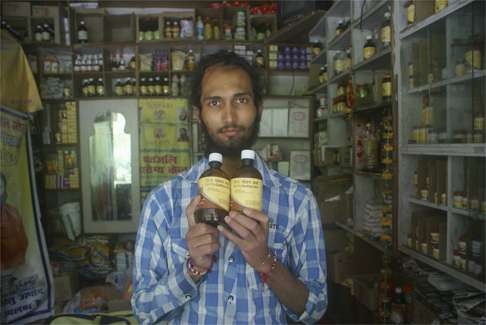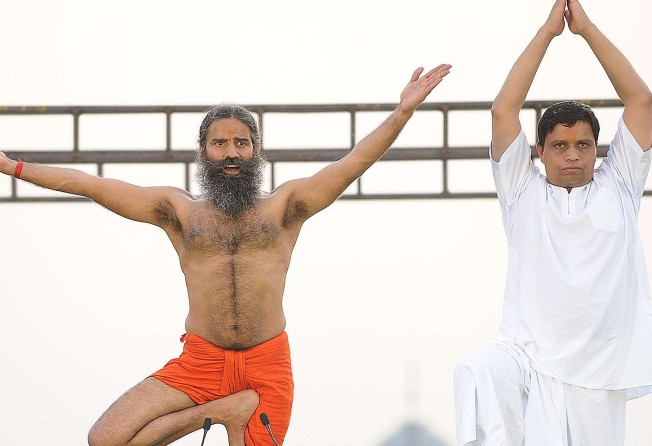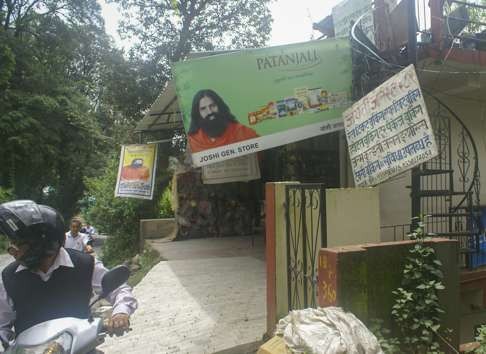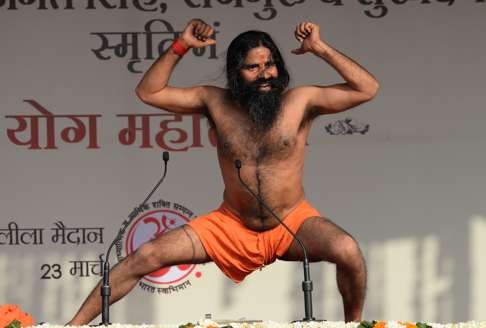
Anyone for Orgy Oil? Yoga guru wants his Ayurvedic medicine to be a global hit
Baba Ramdev, a household name in India, has built a US$750 million empire selling traditional healing products, and wants to introduce them to the world

As the country’s most famous yoga guru, millions of Indians instantly recognise Baba Ramdev’s beard, hirsute chest and toned torso. But now there is also instant recognition for the products that have become part of his massive business empire – food, toiletries, cosmetics and tonics produced according to, he says, the principles of Ayurveda. The range comes under the brand name of Patanjali.
Ramdev, 50, is the first Indian to turn Ayurveda into a money-spinner. A traditional natural healing system practised for 5,000 years, it is the medical side of yoga. It is widely respected in India, but apart from some Ayurvedic medicines and massages offered at tourist resorts, it has remained largely on the fringe. No one has made an Ayurvedic product that has become a household name. No one has created an Indian Ayurvedic brand that is known throughout India.

In addition, the products appeal to the latent patriotism among many Indians who feel pride in their ancient systems, whether Ayurveda, yoga, or their ancient religious and mythological texts. “We sell products because people demand them, we do it for the people and they want good Indian products. This is an Indian product they can be proud of,” says Ramdev.
At a grocery store in New Friends Colony in New Delhi, a separate counter displays some of Patanjali’s over 300 products: creams, oils, shampoos, soaps, tonics, breakfast cereals, sexual remedies (Orgy Oil promises to increase the muscular strength of the penis and fix a curved organ) and medicines catering to every ailment known to mankind.

The company was founded in 2004 when Ramdev’s close friend, Acharya Balkrishna, decided to promote Ayurveda with a range of products. Ramdev has no official function in the company but he is its face and driving force.
With Ramdev’s famous face linked to the products, Balkrishna has hardly had to do any advertising. In fact, people call them Baba Ramdev’s products. Given that, according to Ramdev, some 20 million people have attended yoga camps at his institute in Haridwar over the years, it’s inevitable there is a large measure of trust in the Patanjali brand. Though a controversial figure in Indian public life, Ramdev appears to command vast reserves of respect and loyalty and this has served as an engine for the firm’s growth.

The business operates through about 4,000 dedicated franchise stores. More than 300 people work in the Patanjali R&D department. The firm clearly has its sights set on taking on the big global brands such as Hindustan Unilever, Colgate and Nestlé. In March, it showed this by launching PowerVita, a so-called health and brain tonic to challenge Bournvita and Horlicks. It plans to sell its products on Amazon in the near future.
But where is the proof these products are genuinely Ayurvedic? The Indian Medical Association has taken him to task for advertising Ayurvedic medicines that claim to cure cancer, Aids, and even “cure” homosexuality. Various newspaper reports have appeared over the past few years alleging that, for example, yellow colouring had been added to samples of ghee (clarified butter) and of insects being found in noodles.
In February, Ramdev claimed he was the victim of a conspiracy. “Multinational firms like Hindustan Unilever, Colgate and Nestlé are bribing people to get fake and adulterated Patanjali products tested in labs,” he said. “Sometimes they even produce reports from fake laboratories to malign us.”
Nestlé denied the accusation. A company statement at the time said: “This allegation is incorrect and we do not wish to comment any further on this.”

“Ayurvedic products are different from chemical-based ones. They take time to show their effectiveness because they are natural. They can’t be measured by the same yardstick,” says Kailash Sindhwani, a New Delhi bank manager who buys several Patanjali products regularly.
As Sunil Alagh, a business consultant and former CEO of Britannia Industries, an Indian biscuit giant, says that Indian consumers are concerned about the quality of the food they buy but says it is in the nature of Ayurveda that it either attracts absolute belief or non-belief.
“Either you believe in it or you don’t,” he says.“Indian consumers know that these herbs and spices have been used for centuries so when Baba Ramdev says he is using the same healthy, safe ingredients, they feel secure because the starting point is their belief in Ayurveda.”
According to an interview with livemint.com, Ramdev’s target is a twenty-fold increase from the 50 billion rupees (HK$5.7 billion) in net sales that Patanjali posted in the business year that ended on 31 March. His goal for the next business year is to double that figure.
For Alagh, the success of the brand stems from the fact that Ramdev has been selling his core strength – I am the yoga guru telling you how to be healthy – to his core group of believers. “His challenge now is to convert the non-followers in India into buying his products,” he says.